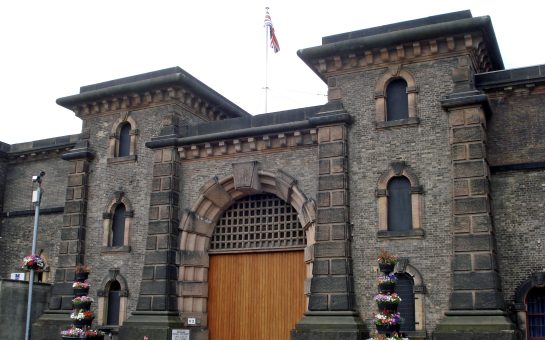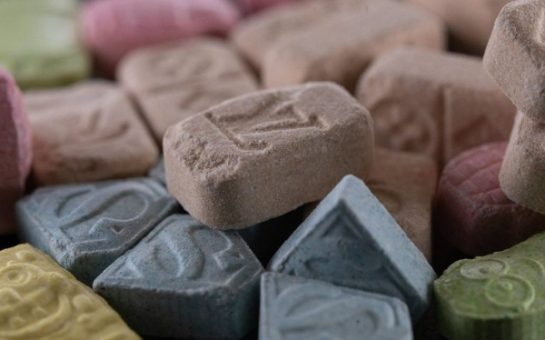By Tara Fair
August 18 2020, 12.25
Follow @SW_Londoner
Public Health England (PHE) issued a warning over a lethal batch of illegal drugs currently in circulation across the UK.
The dangerous tablets are being sold illicitly as benzodiazepines, which are authentically prescribed to treat anxiety or insomnia.
PHE has reported 12 cases in the past four months where these drugs have been toxicologically confirmed in pills linked to death or hospitalisation and are currently reviewing dozens of other incidents.
Although the pills come in various colours, PHE warns most of those causing serious damage are blue and marked with ‘DAN 5620’, ‘10’, ‘T-20’, ‘TEM 20’, ‘Bensedin’ or ‘MSJ’.
This concerning report comes as medical professionals note an increase in illicit prescription pill use, particularly amongst young people.
Founder and leader of the Club Drug Clinic, Dr Owen Bowden-Jones has observed more people seeking help with prescription medicines over the past few years.
The Club Drug Clinic, which is based in Earls Court, London, has been running for nearly 10 years and takes a multi-disciplinary approach to tackling addiction including: psychiatrists, psychologists, doctors, mindfulness therapists and family therapists.
Dr Bowden-Jones explains the people who tend to enter the clinic for help with prescription medicines broadly fall into one of two groups:
Alex, 23, from west London suffers from a generalised anxiety disorder and has been illicitly using benzodiazepines to self-medicate on and off for four years.
Alex insists he has benefitted from self-medicating with benzodiazepines as he says dulling his anxiety makes him a more productive person, more inclined to exercise or socialise and greatly reduces the chance of having a panic attack.
However, he also acknowledges when it wears off and he starts to feel anxious again, is more aware of this sensation, and his first impulse is to take another pill.
This shift towards people using anxiolytic drugs mirrors diagnoses of anxiety are also rising across the UK. However, Alex has also observed an unexpected cultural shift in the social use of this substance: “Over the past few years I’ve seen people taking benzos as a party drug, which seems like a new thing to me – it’s worrying since a lot of people will drink at the same time and not see it as a big deal.”
Drinking alcohol with benzodiazepines exacerbates the sedative effects of the drug and can be dangerous as a result. Combining these substances also greatly increases the likelihood of memory loss.
Alex said: “The first time I tried any form of benzo was on my last day of college, it didn’t seem like a big deal to me. When you’re offered pills that look like they’re from a pharmacy you don’t consider it in the same context as something like a bag of powder.
“Looking back, because there wasn’t much caution there I was completely irresponsible with them – I was drinking at the same time which is incredibly dangerous and didn’t have any idea what an average dose was.”
Dr Bowden-Jones has warned that they often see counterfeit medication of variable doses. This makes things particularly dangerous as people do not know the strength of the tablets or even, on occasion such as the lethal batch currently in circulation, what is in them.
People on benzodiazepines often experience a delusion of sobriety which some people will be familiar with from drinking alcohol – this makes you believe that you are more sober than you are which means it is easy to re-dose at a dangerous level.
Alex added: “This is made worse because it’s really easy to black-out with benzos and sometimes you’ll take a lot more pills than you realise at the time.
“A few years ago I went through about 20 pills over three days without remembering a thing, which was the first major wake-up call for me to start taking them more seriously.”
In September 2019, PHE released a review on the dependence and withdrawal associated with some prescribed medicines, including benzodiazepines.
Benzodiazepines are addictive and people can suffer withdrawal symptoms such as intense anxiety, nausea, insomnia, and headaches if withdrawing suddenly from high doses. For these reasons, clinical guidelines specify that benzodiazepines should not usually be prescribed for longer than two to four weeks.
Nevertheless, the PHE review found that around half of patients were estimated to have been receiving a prescription continuously for at least 12 months when data was collected in 2018. This graph illustrates the number of prescriptions per London clinical commissioning group and how many of those have been taking that prescription for at least 12 months.
PHE found that low income and use of shorter-acting benzodiazepines were associated with long-term benzodiazepine use but that the number of legal prescriptions of the drug were falling.
The review warned that inappropriate limiting of medicines may increase harm, including the risk of suicide, and lead some people to seek medicines from illicit or less regulated sources.
The latest PHE warning over the lethal batch of benzodiazepines illustrates the ultimate risk of turning to illicit sources.
Dr Bowden-Jones said: “Whether people are buying illicit drugs or prescription medicines, they are often not sold what they think they are buying. By the time they are buying on WhatsApp, they are likely to be dealing with a street dealer who has no idea where these have come from.”
WEDINOS (Welsh Emerging Drugs & Identification of Novel Substances) is a harm reduction project and drugs trend lab whereby people send samples of drugs to be tested for free and the results are published on their public facing website. Dr Bowden-Jones insists the WEDINOS testing service is more reliable than test kits bought online.
For confidential advice call the Club Drug Clinic on 020 3317 3000 or email [email protected]




